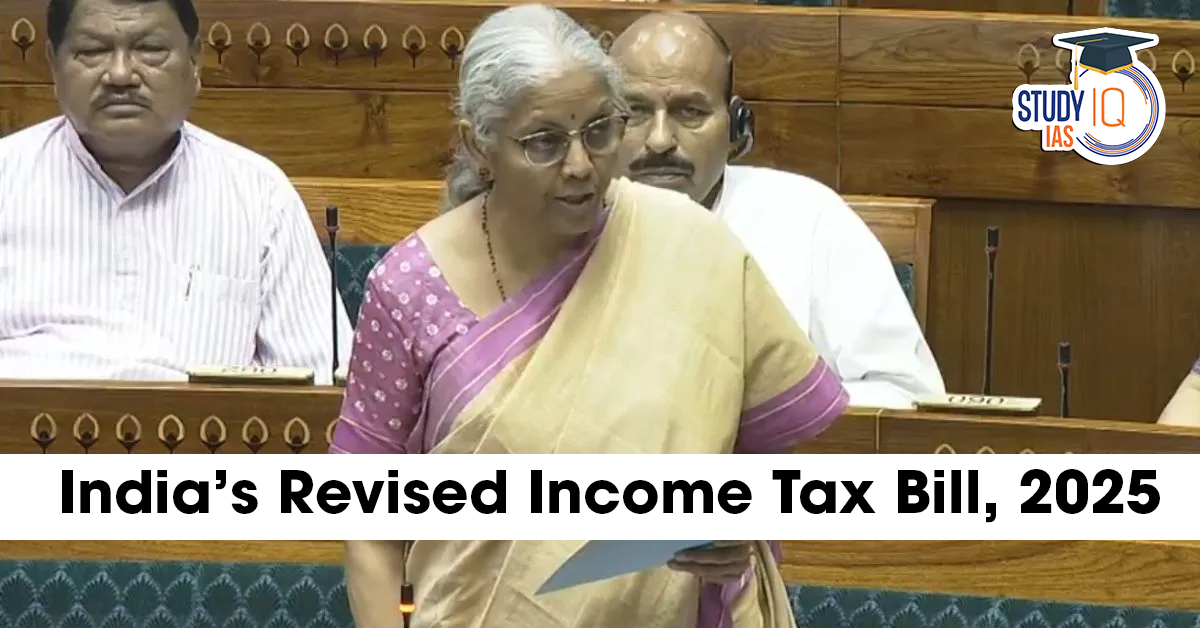Table of Contents
On August 11, 2025, the Government of India introduced the amended Income-tax (No. 2) Bill, 2025, also known as the Income Tax Bill, 2025, in Parliament, hardly three days after retracting the previous draft. The withdrawal on August 8 was in accordance with the recommendations of a parliamentary select committee that suggested more than 285 revisions to the draft bill.
This important legislation aims to supplant the Income Tax Act of 1961, a statute that has underpinned India’s taxation framework for more than sixty years. The new legislation consolidates, streamlines, and modernises income tax regulations to improve compliance, maintain equity, and reduce litigation by removing obsolete and conflicting terms.
The Income Tax Bill of 2025 signifies a domestic fiscal reform and an effort to synchronise India’s taxation system with the requirements of a swiftly globalising and digitally integrated economy.
Key Objectives of India’s Revised Income Tax Bill 2025
The preceding statement of objects and reasons for the bill highlights numerous goals:
- Modernization of Income Tax Law: Revise the outdated and disjointed provisions of the 1961 Income Tax Act.
- Taxpayer Simplification: Minimise complexity by reducing the number of sections from 819 to 536 and chapters from 47 to 23.
- Legal Precision: Guarantee consistent interpretation and reduce potential for conflicts.
- Digital Alignment: Empower the tax department to oversee digital platforms, social media accounts, and virtual digital environments.
- Public-Centric Approach: Integrate public input and the Select Committee’s comprehensive proposals for taxpayer alleviation.
New Tax Regime under Clause 202(1)
One of the central features of the revised bill is the new tax regime. Applicable to individuals, Hindu Undivided Families (HUFs), and other categories of taxpayers, the revised slab system offers simplified tax rates:
| Income Slab (INR) | Tax Rate |
| Up to 400,000 | No tax |
| 400,001 – 800,000 | 5% |
| 800,001 – 1,200,000 | 10% |
| 1,200,001 – 1,600,000 | 15% |
| 1,600,001 – 2,000,000 | 20% |
| 2,000,001 – 2,400,000 | 25% |
| Above 2,400,000 | 30% |
This progressive structure mirrors the Union Budget 2025 announcements and provides predictability for taxpayers.
Income Tax Rebate under Section 87A
The refund under Section 87A persists, accompanied by substantial improvements:
- Current limit (per the 1961 Act): Full refund or INR 12,500 (whichever is lesser) if total income is less than or equal to INR 500,000.
- New system (Clause 202(1)): Rebate of the total tax owed or INR 60,000, whichever is lesser.
- Eligibility is confined to resident persons, excluding non-residents, corporations, and partnerships.
Exemptions from the Section 87A refund
- Long-term capital gains (LTCG) on publicly traded equity shares.
- Long-term capital gains from equity-oriented mutual funds under Section 112A are subject to a tax rate of 12.5%.
- This differentiation guarantees that the refund benefits typical salaried taxpayers instead of affluent investors.
Relief Measures and Compliance Easing
The legislation includes a collection of compliance-oriented stipulations:
- Exemption for commuted pensions: Specific deduction for lump-sum pensions withdrawn from sanctioned accounts (e.g., LIC Pension Fund).
- No Alternate Minimum Tax (AMT) imposed on Limited Liability Partnerships (LLPs): A relief for partnerships, harmonising their treatment with corporate regulations.
- Charitable Trusts: Eased regulations to assist NPOs, including an exemption for 5% of total donations rather than solely 5% of anonymous contributions.
- Transfer Pricing (TP): A more specific and refined definition of “Associated Enterprises” to mitigate disputes.
- These improvements embody the Select Committee’s focus on equity and administrative efficacy.
Select Committee Recommendations
The Select Committee’s 4,500-page report presented extensive enhancements:
- Obtain NIL-TDS certification for persons without tax liability.
- Vacant property relief: Abolition of notional rent taxation on unoccupied houses.
- Home loan interest deductions have been extended to include rented properties.
- Procedural reforms: Reduction of fees for advance decisions, clarification regarding provident fund withdrawals, and reduction of penalties.
- Consistency in MSME: Implementation of the term as stipulated in the MSME Act.
- Expansion of pension benefits: Extension of commuted pension benefits beyond former employees.
- The adoption of almost all these recommendations highlights the government’s consultative methodology.
Income Tax Act, 1961 vs. Income Tax Bill, 2025
The new bill radically differs from its predecessor:
- Reduction of sections: From 819 → 536.
- Reduction of words: From 512,000 → 260,000.
- Introduction of “Tax Year”: A single concept replacing “Previous Year” and “Assessment Year.”
- Tables and formulas: 39 new tables and 40 formulas for uniform interpretation.
- This simplification is intended to make tax law accessible to ordinary citizens while reducing litigation.
Digital Taxation and Privacy Issues
- A problematic aspect is the definition of “virtual digital space.” The income tax authorities possess the authority to access:
-
- Email servers
- Social media profiles
- Cloud-based and remote servers
- Digital investment and banking accounts
- This improves the state’s capacity to combat tax evasion in a digital economy; however also presents privacy issues. The government has pledged to establish a Standard Operating Procedure (SOP) for the management of personal data.
The Taxation Laws (Amendment) Bill of 2025
- The government submitted amendments to the Finance Act, 2025, in conjunction with the Income Tax Bill.
- The Public Investment Fund (PIF) of Saudi Arabia has been granted a specific exemption from taxation on dividends, interest, and long-term capital gains. This reflects the previous treatment of the Abu Dhabi Investment Authority.
- The Unified Pension Scheme (UPS) achieves equivalence with the National Pension Scheme (NPS), permitting tax-exempt withdrawal of up to 60% of the total accrued corpus.
- This enhances India’s desirability as a destination for foreign sovereign wealth funds.
The International Implications of India’s Income Tax Legislation
The amended statute possesses considerable international ramifications:
- Investment Environment: By exempting sovereign wealth funds like Saudi Arabia’s PIF and Abu Dhabi’s ADIA, India demonstrates its dedication to attracting sustained international finance.
- The legislation harmonises India’s tax framework with OECD principles of tax transparency, especially regarding taxation in the digital economy.
- Competitiveness: By streamlining compliance and abolishing AMT for LLPs, India aims to compete with Singapore, the UAE, and other Asian centres as a foundation for startups and multinational enterprises.
- Digital Oversight: The authorisation of tax authorities to scrutinise virtual digital environments aligns with global initiatives addressing Base Erosion and Profit Shifting (BEPS), although India must reconcile privacy concerns with surveillance requirements.
- Consequently, the Income Tax Bill, 2025, situates India at the intersection of domestic simplification and global competitiveness.
The Way Forward
- The Income Tax Bill, 2025, signifies the most ambitious tax reform since independence, intending to revamp a six-decade-old framework.
- The bill embodies a contemporary fiscal philosophy focused on clarity, equity, and digital adaptability through the implementation of streamlined tax brackets, increased rebates, compliance alleviation, and exemptions for international investors.
- Nonetheless, obstacles persist:
-
- Safeguarding data privacy amidst digital surveillance.
- Preventing the abuse of discretionary authority by tax officials.
- Ensuring that simplification results in diminished litigation.
- The efficacy of this legislation will ultimately hinge on its execution. If implemented successfully, the Income Tax Bill, 2025, could exemplify a framework for developing countries aiming to reconcile domestic equality with global integration.


 Warring Couples Cannot Make Courts Their...
Warring Couples Cannot Make Courts Their...
 Tackling Child Trafficking in India: Leg...
Tackling Child Trafficking in India: Leg...
 In Overcrowded Prisons, Justice Has Lost...
In Overcrowded Prisons, Justice Has Lost...



















